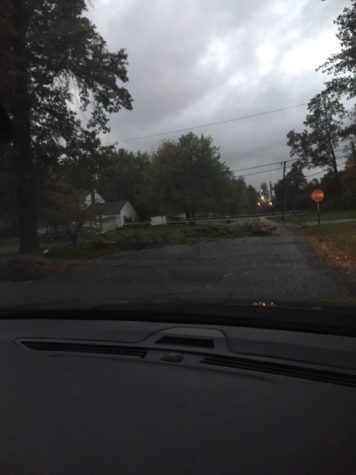Extensive Teen Driving Laws
December 19, 2017
 Imagine being 16 years old, walking into the Department of Motor Vehicles (DMV), about to pick up the wallet size piece of plastic that says that you are qualified to drive. Excitement flooding through your body as you are about to be granted the freedom everyone dreams of. Now, picture yourself 6 months later, not being able to drive your friends, having to take multiple cars to one place, and having to be off the road by 11 p.m.. All the freedom you dreamt this piece of plastic would bring is being suffocated by the overextended teen driving laws.
Imagine being 16 years old, walking into the Department of Motor Vehicles (DMV), about to pick up the wallet size piece of plastic that says that you are qualified to drive. Excitement flooding through your body as you are about to be granted the freedom everyone dreams of. Now, picture yourself 6 months later, not being able to drive your friends, having to take multiple cars to one place, and having to be off the road by 11 p.m.. All the freedom you dreamt this piece of plastic would bring is being suffocated by the overextended teen driving laws.
What are the teen driving laws in Connecticut? According to CT.GOV, during the 1st 6 months newly licensed drivers may not have any passengers in the vehicle except for licensed driving instructor, parents or legal guardian (one of whom holds a valid license) or person providing instruction whom is at least 20 years old and has had a license for four years without any suspensions. In addition, after 6 months you may drive immediate family, and after 1 year all passenger restrictions are lifted. However, until your 18th birthday, you may not be driving from 11 p.m. to 5 a.m., unless employment, school, religious activities, or medical necessity.
As a teen driver myself, I wanted to know if other teens felt the same way about the CT teen driving curfew as I do: heavily restricted for far too long. Olivia DeMaio, a Senior at Hall, states, “The Curfew should be eliminated once you have had your license for 6 months.” This is a safe alternative to having curfew until the age of 18, because the driver will have 6 months of experience. Also the curfer simply just does not make sense. Lindsey Schmucker, a Junior at Hall, says, “The curfew makes no sense because if anything it’s safer to drive late at night when there is so few people on the road versus rush hour. Rush hour is so much more dangerous.” According to UNC, 1 in 4 car crashes occur during rush hour. Furthermore, if the reason behind this is because of drowsiness while driving late at night, what makes it okay for adults to be driving drowsy?
Besides the driving curfew, a problem has arisen with who you can drive, and when you can drive them. Hannah Pliskin, a senior at Hall, states, “Maddy [twin sister] and I couldn’t drive together for 6 months, even though we were going to all of the same places!” This is absurd! Picture having to switch days with your sibling of who has to take the bus in the morning and who gets to take the car. These two twins are not alone, Isabelle Amato, a senior at Hall, expresses, “I agree with the twin thing, we share a car so it was a pain.” Not only is this law an inconvenience to twins and siblings, some say driving with others makes them feel safer. Addie Bassock, a senior at Hall, reveals, “Having people in my car usually helps me focus. The rule should be you can have one other person in your car. Whenever I drive long distances to Vermont or Boston, I hate driving alone, and having someone else in the car makes me more aware especially because you wouldn’t want to hurt another person.” Therefore, the amount of time that teens have a curfew and have to wait to drive friends should shortened.
A teen driver who would like to remain anonymous shared their story saying, “After I got into a car accident that wasn’t my fault, I got fined and got my license suspended because someone else was in the car. But, the guy who ran the stop sign got fined less than me and did not get his license suspended.” Obviously this person was breaking the law, and deserved the consequence, however, it is baffling that the person who caused the accident received less of a fine.
In addition to getting the view that teen drivers themselves possess, I also got the views of drivers who recently got their restrictions lifted, and parents of teen drivers. Austin O’Connell, a graduate of Hall’s class of 2015, states, “I do not feel like the teen driving laws are effective. Having the driving curfew until I was 18 was a struggle because often times I had to be home at 11 p.m. because I was driving, even though my curfew set by my parents was 12 a.m..” If these curfews do not help in the present time, or the future, then what are they here for? Deb O’Connell, a mother of three girls whom all have license, says, “Although I understand the reasons behind the teen driving laws, it has become more inconvenient to have to pick my daughter up if driving past 11 p.m., when she’s just watching a movie at a friends house.”
Knowing that some states have different driving laws, I gathered some information on what they are, and how long they are in place for. According to AAA, in Florida, when you are 16 years old, the driving curfew is 11 p.m. to 6 a.m., and then when you turn 17 the curfew is 1 a.m. to 5 a.m.. In Massachusetts, within the first 6 months you cannot drive anyone under 18 except family. In addition, after 6 months or 18th birthday, all passenger restrictions are lifted. If Massachusetts, a state that borders Connecticut, can have these driving laws, why can’t Connecticut? Ergo, it is time that the teen driving laws in Connecticut are reconsidered.
